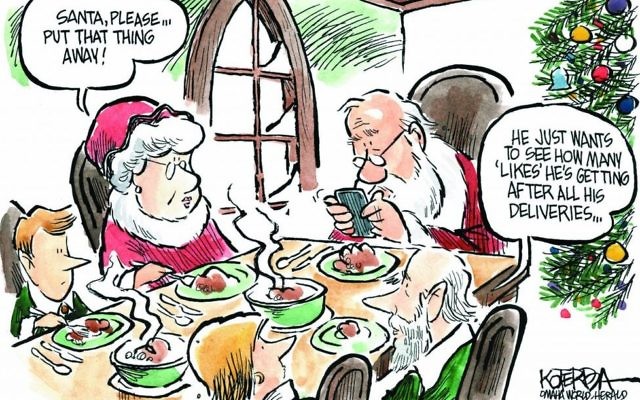Christmas Presence Haunts Kindergarten Classes
Christmas is the only religious holiday included on a list of holidays kindergartners are required to learn about.
The Georgia Department of Education is implementing a new curriculum requirement to teach Christmas in kindergarten despite pleas from educators and Jewish community members.
Requests came from the Georgia Council for the Social Studies and Rabbi Steven Lebow of Temple Kol Emeth are among those who have requested revisions to the new Georgia Standards of Excellence for Social Studies.
The new standards will be implemented this school year for the more than 125,000 kindergartners in the state.
Christmas is the only religious holiday included on a list of holidays kindergartners are required to learn about, including Labor Day, New Year’s Day, Martin Luther King Jr. Day and Presidents Day.
“In the kindergarten social studies standards, students learn about federal holidays,” GaDOE told the AJT. “The standard reads, ‘Identify the national holidays and describe the people and/or event celebrated.’ As Christmas is a federal holiday, it is included in that standard.”
The state department led a yearlong analysis of the Georgia Standards of Excellence for Social Studies, which the state Board of Education unanimously approved June 8, 2016. But GCSS stated in a letter that the Department of Education added Christmas and Columbus Day to the required lists after the review process.
“During the revision process, Christmas was not included as a national holiday in the standards,” GCSS Executive Director Eddie Bennett wrote. “Later, when it was added, we requested that Christmas be removed. We felt that teaching about one holiday that represented one particular faith was inappropriate.”
Bennett added: “I spoke to several people in the Jewish community who were concerned. Because our student population is so diverse, I believe that it is appropriate to teach about other religious holidays including Jewish holidays and holidays of other religious groups,” which would include Christmas.
Regarding Christmas, the Standards of Excellence for Social Studies read, “Kindergarten students should know that Christmas is a national holiday that is celebrated on December 25th each year.”
GCSS called for action in a letter to its members: “Those of us who have been carefully watching the review process unfold were very surprised to find there are major discrepancies between the work of the (March 16, 2016) review committee and the now posted ‘draft’ standards. It seems that certain items were dropped into the curriculum after the committee had completed their work and voted on the changes made to each grade level/course.”
Teachers from across the state were involved in revising the state curriculum standards for social studies, guided by 9,000 comments from parents, teachers and officials. At each step, committee members documented changes and cited support and commentary from the surveys.
Yet, GCSS wrote, the last-minute change to add Christmas appears to be out of line with the public and formal revision process that was adopted and followed.
GCSS said the review committee meeting March 16, 2016, included email messages and letters from public figures that were not part of the teacher surveys. “If a few people are able to overturn the comments of thousands and the work of hundreds who were a part of the committees, then the whole process is called into question.”
GCSS implored concerned people to contact state Board of Education members.
When Temple Kol Emeth member Rena Zweben read about the standards, she approached Rabbi Lebow.
“We have tried to take measured steps to not make a huge ordeal initially,” Zweben said.
“You get more results with honey than with vinegar,” she said. “We didn’t want this to be perceived as ‘Oh, this Jewish organization is bent out of shape because this is not their holiday.’ We tried to engage cooperation and dialogue in hopes that cooler minds could resolve this in a way that made a lot of people happy.”
Rabbi Lebow wrote a letter to The Atlanta Journal-Constitution that was not printed. He said he contacted state education officials three times but did not receive a response.
In a column written for the AJT, “Don’t Teach Christmas to Kindergartners,” Rabbi Lebow wrote: “How does the state mandate the teaching of Christmas without any reference to its religious roots and core values? Christmas is not just a holiday, like Veterans Day or Presidents Day. To the world’s 1 billion Christians, it is the birthday of Jesus Christ, their lord and savior. How can the state of Georgia demand the teaching of Christmas without any reference to its religious importance?”
Zweben echoed those concerns. “How will they maintain separation of church and state? Where does that leave kids who are non-Christians? It’s one thing to celebrate all the holidays. It’s different to talk about federal holidays and people who are integral to that holiday. For example, on Martin Luther King Jr. Day, you talk about Martin Luther King Jr. You talk about Christmas, and where do you go?”
Andrea Young, the executive director of the American Civil Liberties Union of Georgia, said: “By requiring discussion of a religious holiday of one faith and no other religious holidays, these standards could put schools at risk of violating students’ constitutional rights, especially because they apply to very young children. Schools need to be careful that they don’t cross the line into proselytizing or indoctrination when teaching about any holiday with religious connotations. The risk of religious coercion is especially high when young children are involved because they are more impressionable.”




comments